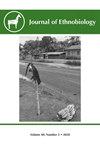Thinglhang Lou: Linkages Between Swidden, Culture, and Ecology in Manipur, Northeast India
IF 1.3
3区 社会学
Q1 ANTHROPOLOGY
引用次数: 0
Abstract
Emerging human ecological discussions bring forth literature and studies from marginalised groups and indigenous communities whose knowledge about nature and subsistence livelihood practices have long been seen as ‘non-scientific’ and, therefore, unworthy of serious research. As a result, perceptions of swidden cultivation as ‘destructive’ to ecosystems are changing, and studies now focus on the interlinkages of swidden farmers with land, animals, identity, and livelihoods. In this paper, we argue that swidden should be considered as a farming practice that goes beyond subsistence and overlaps with people's belief systems and social and eco-cultural lifeways. Using the notion of thinglhang lou, the swidden practice of Manipur's Kuki, we show the interlinkages between land, humans, and spirits and the important role they play in their socio-cultural worlds. Through ethnographic exploration involving participant observation, interviews, and focus group discussions among the Kuki, this study shows how and in what ways swidden farming helps in understanding cultural linkages with ecological sustainability. With modern developments radically altering the habitat and eroding cultural heritage, we argue that Kuki's notion of thinglhang lou can be a powerful contribution to our understanding of the environment and knowledge systems.卢Thinglhang:印度东北部曼尼普尔的瑞典、文化和生态之间的联系
新兴的人类生态讨论带来了来自边缘群体和土著社区的文献和研究,他们对自然和生存生计实践的知识长期以来被视为“非科学的”,因此不值得认真研究。因此,人们对荒地耕作对生态系统具有“破坏性”的看法正在发生变化,现在的研究重点是荒地农民与土地、动物、身份和生计之间的相互联系。在本文中,我们认为应将雪耕视为一种超越生存的农业实践,与人们的信仰体系以及社会和生态文化生活方式重叠。我们利用曼尼普尔Kuki的普遍实践“物悬挂”的概念,展示了土地、人类和精神之间的相互联系,以及它们在社会文化世界中扮演的重要角色。通过参与观察、访谈和库基人的焦点小组讨论等民族志探索,本研究展示了快速农业如何以及以何种方式帮助理解文化与生态可持续性的联系。随着现代发展从根本上改变了栖息地,并侵蚀了文化遗产,我们认为库基的“物低”概念可以为我们对环境和知识体系的理解做出强有力的贡献。
本文章由计算机程序翻译,如有差异,请以英文原文为准。
求助全文
约1分钟内获得全文
求助全文
来源期刊

Journal of Ethnobiology
Social Sciences-Anthropology
CiteScore
4.80
自引率
3.40%
发文量
21
审稿时长
>12 weeks
期刊介绍:
JoE’s readership is as wide and diverse as ethnobiology itself, with readers spanning from both the natural and social sciences. Not surprisingly, a glance at the papers published in the Journal reveals the depth and breadth of topics, extending from studies in archaeology and the origins of agriculture, to folk classification systems, to food composition, plants, birds, mammals, fungi and everything in between.
Research areas published in JoE include but are not limited to neo- and paleo-ethnobiology, zooarchaeology, ethnobotany, ethnozoology, ethnopharmacology, ethnoecology, linguistic ethnobiology, human paleoecology, and many other related fields of study within anthropology and biology, such as taxonomy, conservation biology, ethnography, political ecology, and cognitive and cultural anthropology.
JoE does not limit itself to a single perspective, approach or discipline, but seeks to represent the full spectrum and wide diversity of the field of ethnobiology, including cognitive, symbolic, linguistic, ecological, and economic aspects of human interactions with our living world. Articles that significantly advance ethnobiological theory and/or methodology are particularly welcome, as well as studies bridging across disciplines and knowledge systems. JoE does not publish uncontextualized data such as species lists; appropriate submissions must elaborate on the ethnobiological context of findings.
 求助内容:
求助内容: 应助结果提醒方式:
应助结果提醒方式:


